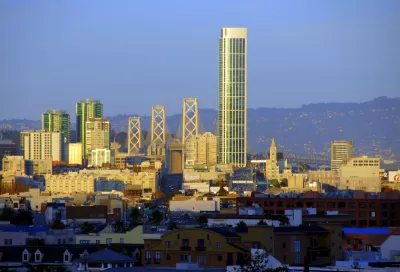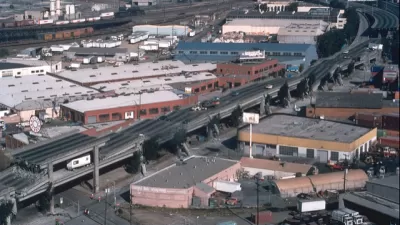San Francisco becomes the 40th city statewide to legislate a ban on natural gas in development projects.

San Francisco has followed in Berkeley's historic 2019 footsteps to place a city-wide ban on the use of natural gas in new buildings.
"In a meeting on Tuesday, the city's Board of Supervisors passed legislation requiring new residential and commercial building construction to utilize all-electric power, starting with projects that file permits next year," reports Kristin Musulin.
The ordinance comes as part of an ongoing effort on the part of city officials to reduce climate change-fueling carbon dioxide emissions, says District 8 Supervisor Rafael Mandelman, connecting the state's brutal 2020 wildfire season to the destructive effects of climate change.
"The board's unanimous vote concludes nearly a year of deliberation with the Zero Emissions Building Taskforce, Mandelman said, which brought together affordable housing and mixed-use developers, architects and engineers, labor and building trades and community advocates to craft the legislation," writes Musulin.
Since Berkeley passed a groundbreaking gas banning ordinance in 2019, 40 cities in California have followed suit. Musulin reports that ordinance proponents are now looking to large cities like Los Angeles to pass gas ban legislation and for Governor Gavin Newsom to champion statewide legislation.
Musulin's article lays out several lines of reasoning for San Francisco's recent ordinance and describes how "a shift to all-electric construction can be done incrementally to ensure it doesn't overburden industries."
FULL STORY: San Francisco's gas ban on new buildings could prompt statewide action

Study: Maui’s Plan to Convert Vacation Rentals to Long-Term Housing Could Cause Nearly $1 Billion Economic Loss
The plan would reduce visitor accommodation by 25,% resulting in 1,900 jobs lost.

North Texas Transit Leaders Tout Benefits of TOD for Growing Region
At a summit focused on transit-oriented development, policymakers discussed how North Texas’ expanded light rail system can serve as a tool for economic growth.

Why Should We Subsidize Public Transportation?
Many public transit agencies face financial stress due to rising costs, declining fare revenue, and declining subsidies. Transit advocates must provide a strong business case for increasing public transit funding.

Alabama: Trump Terminates Settlements for Black Communities Harmed By Raw Sewage
Trump deemed the landmark civil rights agreement “illegal DEI and environmental justice policy.”

Dear Tesla Driver: “It’s not You, It’s Him.”
Amidst a booming bumper sticker industry, one writer offers solace to those asking, “Does this car make me look fascist?”

A Visual Celebration of Manhattan’s Chinatown Elder Community, Through Food
Lanterns, cafeteria trays, and community connection take center stage in this stunning photo essay.
Urban Design for Planners 1: Software Tools
This six-course series explores essential urban design concepts using open source software and equips planners with the tools they need to participate fully in the urban design process.
Planning for Universal Design
Learn the tools for implementing Universal Design in planning regulations.
City of Santa Clarita
Ascent Environmental
Institute for Housing and Urban Development Studies (IHS)
City of Grandview
Harvard GSD Executive Education
Toledo-Lucas County Plan Commissions
Salt Lake City
NYU Wagner Graduate School of Public Service



























